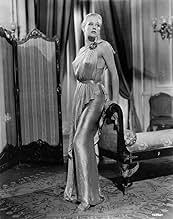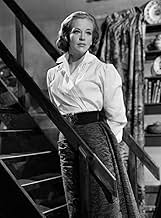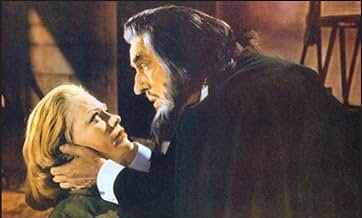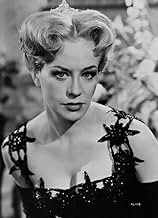Füge eine Handlung in deiner Sprache hinzuThe story of a genius who hypnotizes an artist's model into becoming a great concert singer, and how she escapes from his influence only by his death.The story of a genius who hypnotizes an artist's model into becoming a great concert singer, and how she escapes from his influence only by his death.The story of a genius who hypnotizes an artist's model into becoming a great concert singer, and how she escapes from his influence only by his death.
- Regie
- Drehbuch
- Hauptbesetzung
- Nominiert für 1 BAFTA Award
- 1 Nominierung insgesamt
Hildegard Knef
- Trilby
- (as Hildegarde Neff)
Empfohlene Bewertungen
SVENGALI is a British-made version of the classic story about the evil hypnotist who creates a famous singer out of a young and untalented girl. In essence this tale is Rasputin in the music world, and it's quite a fun and eventful storyline.
The main reason to enjoy this film is the performance of Donald Wolfit (BLOOD OF THE VAMPIRE) in the title role. He seems to be channelling Bela Lugosi in both look and voice throughout the movie, and his hammy style of acting is a lot of fun; the other actors in the production feel flat by comparison.
The film as a whole isn't perfect - there's a little too much sappy romance going on, and events are never as exciting or dramatic as the producers would hope for - but the lush colours and costumes of the mid 1950s give this the look and feel of an early Hammer Horror outing. Hildegard Knef (later of Hammer's THE LOST CONTINENT) is fine as the youthful protégé, and it's fun to see Terence Morgan (CURSE OF THE MUMMY'S TOMB) before he got typecast as the bad guy.
The main reason to enjoy this film is the performance of Donald Wolfit (BLOOD OF THE VAMPIRE) in the title role. He seems to be channelling Bela Lugosi in both look and voice throughout the movie, and his hammy style of acting is a lot of fun; the other actors in the production feel flat by comparison.
The film as a whole isn't perfect - there's a little too much sappy romance going on, and events are never as exciting or dramatic as the producers would hope for - but the lush colours and costumes of the mid 1950s give this the look and feel of an early Hammer Horror outing. Hildegard Knef (later of Hammer's THE LOST CONTINENT) is fine as the youthful protégé, and it's fun to see Terence Morgan (CURSE OF THE MUMMY'S TOMB) before he got typecast as the bad guy.
One of several big screen adaptations of du Maurier's TRILBY, this was notable for utilising the author's original illustrations in costume, and to some extent, settings. It also had the benefit of a characteristically flamboyant and forceful performance from the great Donald Wolfit. He's able to engender a small degree of sympathy for the grubby and boorish Svengali (including his frustration, as a classical musician, with Trilby's continual rendering of a rather wan little ditty, 'Alice, Where Art Though?' later to form the aptly dowdy signature tune to OPEN ALL HOURS). He's compelling whenever the film focuses on him, despite more than a touch of Frankie Howerd in places. Unfortunately it concentrates rather too much in the early stages on the ageing English art students, and not helped by some crude editing, the story doesn't grip as it should. Hildegarde Neff brings beauty, intelligence and a sense of vulnerability to Trilby, but she comes over as about as Irish as Elisabeth Schwarzkopf, whose sublime lyric soprano tones are heard on the soundtrack. Terence Morgan can make little impact as Billy, and despite being good to look at, with the colour and atmosphere of the early Hammer horrors, the whole enterprise is lacking in drive, with too many short scenes on cramped sets. The finale at Covent Garden where Svengali dramatically relinquishes his hold on Trilby is especially disappointingly handled, with the director failing to build any tension or sense of occasion, then allowing what remains to fall flat.
One of those films that has its moments, but falls firmly into the 'could have been so much better' category.
One of those films that has its moments, but falls firmly into the 'could have been so much better' category.
This is quite an unusual film in that certain scenes don't make a lot of sense - storylines are clumsily and swiftly manifested with no real development and thus there is no real tension when there needs to be, however, it is visually interesting and at times beautifully lit and shot with great and believable sets.
I'm not sure if the script or the editing is at fault but think that it's some of both in equal measure that leaves the viewer at times thinking "Why was that just said?" or "Why did that character just behave like that?" or "How much time has passed between the last scene and this scene?" or "Ok, so this now appears to be the main thread of the story, why was it so long in being made apparent and why was it developed so clumsily" etc. These questions arising really put in my mind the appalling (but awfully good fun) script, and (lack of) continuity of Tommy Wiseau's "The Room".
Apart from it's script and editing/continuity reminding me of "The Room" and the storyline being reminiscient of "The Red Shoes" - possessive control-freak older man, seeks to control young woman performing against the will of her lover, - "Svengali" also reminds me of another unusual film set in Paris and made in the 1950s called "Man On The Eiffel Tower". This film is also visually interesting and nicely art-directed but also suffers from (at times) an unintelligable script and very poor continuity.
The intention of "Svengali" is of course good but poor execution of basic story-telling damages the impact of the film substantially - but I still quite liked it!
Look out for the very young and beautiful, (uncredited - even though he has some lines), great Jeremy Brett in his first feature.
I'm not sure if the script or the editing is at fault but think that it's some of both in equal measure that leaves the viewer at times thinking "Why was that just said?" or "Why did that character just behave like that?" or "How much time has passed between the last scene and this scene?" or "Ok, so this now appears to be the main thread of the story, why was it so long in being made apparent and why was it developed so clumsily" etc. These questions arising really put in my mind the appalling (but awfully good fun) script, and (lack of) continuity of Tommy Wiseau's "The Room".
Apart from it's script and editing/continuity reminding me of "The Room" and the storyline being reminiscient of "The Red Shoes" - possessive control-freak older man, seeks to control young woman performing against the will of her lover, - "Svengali" also reminds me of another unusual film set in Paris and made in the 1950s called "Man On The Eiffel Tower". This film is also visually interesting and nicely art-directed but also suffers from (at times) an unintelligable script and very poor continuity.
The intention of "Svengali" is of course good but poor execution of basic story-telling damages the impact of the film substantially - but I still quite liked it!
Look out for the very young and beautiful, (uncredited - even though he has some lines), great Jeremy Brett in his first feature.
Svengali, like the Curate's egg, yes it is an interesting rendition, an old story, pretty much still extant if all the stories out there are to be believed. Anyway, here we go, Hildegard Neff, luminous and totally perfect, the rest of the ensemble cast, pretty good, but in my humble opinion the great man, the doyen of the theatre and many.adventures on the silver screen was quite wooden one minute then possessed of the manucc overdone ham on the bone the next. I know this may be heresy to some, but his oeuvre has its brilliant highlights yes, but sometimes I feel his fellow thesis are a little over awed by his classic acting style.. Overall though spotting the other wee gems in there..Alfie Bass.. Harry Seacombe.. Jeremy Brett et al ..make this rewarding.
Donald Wolfit gets my vote as Best Animated Cartoon character of 1955. He cracks his fingers before 'playing' the piano, just like Bugs Bunny!
I think this Svengali dies of overacting.
There is a special bonus in this film: an uncredited (and very young) Jeremy Brett appears as a very happy art student in two sequences. He has a few lines and some nice closeups, and even gets to sing along with Harry Secombe on "Alice Where Art Thou". A curious concept.
Hildegarde Knef is very beautiful and the film is nicely art directed, except when she wears the Dior gowns. And the 'art' is pure Fifties kitsch. Some of the dialogue is so hilarious you will be yelling along with it, ROCKY HORROR-SHOW style.
I think this Svengali dies of overacting.
There is a special bonus in this film: an uncredited (and very young) Jeremy Brett appears as a very happy art student in two sequences. He has a few lines and some nice closeups, and even gets to sing along with Harry Secombe on "Alice Where Art Thou". A curious concept.
Hildegarde Knef is very beautiful and the film is nicely art directed, except when she wears the Dior gowns. And the 'art' is pure Fifties kitsch. Some of the dialogue is so hilarious you will be yelling along with it, ROCKY HORROR-SHOW style.
Wusstest du schon
- WissenswertesHildegard Knef's singing was dubbed by Elisabeth Schwarzkopf.
- Zitate
Svengali: If you choose you can put all that nonsense behind you forever.
Trilby O'Farrall: And do what, starve?
Svengali: Not if you put your trust in me absolutely, not if you do exactly what I tell you to do.
- Crazy CreditsOpening credits prologue: Paris The Latin Quarter at the turn of the Century
- VerbindungenReferenced in Hilde (2009)
Top-Auswahl
Melde dich zum Bewerten an und greife auf die Watchlist für personalisierte Empfehlungen zu.
Details
- Erscheinungsdatum
- Herkunftsland
- Sprache
- Auch bekannt als
- Sihirbazın İntikamı
- Drehorte
- Produktionsfirma
- Weitere beteiligte Unternehmen bei IMDbPro anzeigen
- Laufzeit
- 1 Std. 22 Min.(82 min)
- Farbe
- Seitenverhältnis
- 1.37 : 1
Zu dieser Seite beitragen
Bearbeitung vorschlagen oder fehlenden Inhalt hinzufügen




































